 |
 |
 |
 |
 |
 |
 |
 |
 |
 |
 |
 |
 |
 |
| |
POETS' HILL AT BEECHWOOD CEMETERY
Beechwood Cemetery, with its long history, tall ancient maples and swaying grasses is the final home of Ottawa’s Confederation poets, Archibald Lampman (1899), Duncan Campbell Scott (1947), and William Wilfred Campbell (1918). More than forty of Ottawa's finest writers of the 19th and 20th centuries, journalists, historians and poets, including John Newlove (2003), are interred in these lovely landscaped grounds. Poet’s Hill, the last anchor of the Poets’ Pathway, sits proudly at the main entrance to the cemetery. |
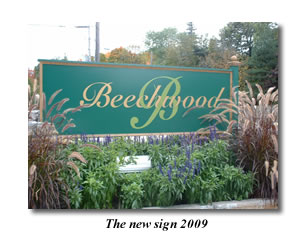 |
 |
 |
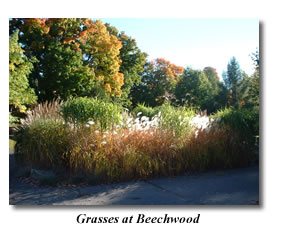 |
|
 |
The cemetery is a National Historic Site, and presently houses 75,000 people. Amongst them are some of Ottawa’s historical greats. Politicians and historians and scientists, as well as literary giants of their day all lie here.
Sir Robert Borden, Canada's eighth prime minister and one of the Fathers of Confederation is buried at Beechwood Cemetery. Sir Sandford Fleming and Tommy Douglas rest here. The famous naturalist, John Macoun, is buried here. Some notable federal figures here are: William Macdougall, Father of Confederation; Thomas Fuller II, the chief architect of the Parliament Buildings; Ray Hnatyshyn, Governor General from 1990 to 1995; Tommy Douglas, the Saskatchewan premier who introduced universal public health care, who lies in the gazebo in the Botanical Cremation Gardens. A plaque beneath his name says: "Courage, my friends, 'tis not too late to make a better world.” |
 |
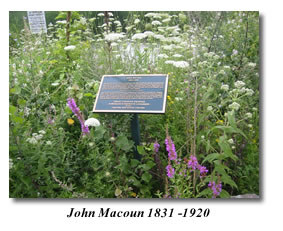 |
 |
| |
Poets buried in Beechwood Cemetery:
Arthur Stanley Bourinot
Sir John George Bourinot
William Wilfred Campbell
Frederick Augustus Dixon
Norman Gregory Guthrie alias John Crichton
Archibald Lampman
William Dawson LeSeuer
William Pittman Lett
Henry James Morgan
John Newlove
Marian Osborne
John Almon Ritchie
Duncan Campbell Scott
Gustavus William Wicksteed
Nicholas Flood Davin has a memorial
|
|
 |
The cemetery was named Canada’s National Cemetery in 2009, and is the National Military Cemetery of the Canadian Forces. There are sections for those who served overseas in the First World War, the Second World War and the Korean War. There are veterans from the North West Rebellion in 1885, and recent United Nations campaigns.
There are gardens, nature paths, and special monuments, including one to the Canadian victims of the Sept. 11, 2001 attack on the World Trade Towers. Macoun Marsh is in the cemetery. The Sacred Space is a new multi-faith memorial hall that uses features from different religions and from nature to create a peaceful place for all people. |
 |
| |
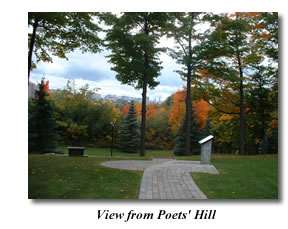 |
 |
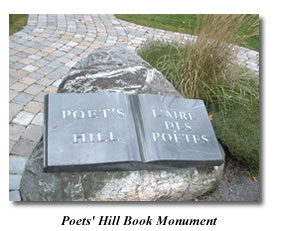 |
 |
 |
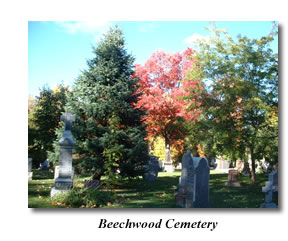 |
 |
Poets' Hill
The beautiful Poet’s Hill, originally conceived as the third anchor of the Poets’ Pathway, became a reality in 2006, thanks to Dr. Steven Artelle and the Beechwood Cemetery Foundation.
Soon after the entrance from Beechwood Road, a plaque marks the base of the hill. At the top amongst the grass and trees is a monument of an open book, inscribed Poet’s Hill, l’aire des poètes. The Parliament Buildings can be clearly seen in the distance from this spot.
Nearby, there is a podium, and four flower beds, each marking a different time, dedicated to these Ottawa writers: William Pittman Lett, Arthur Bourinot, Archibald Lampman, John Newlove.
There is a plaque for William Gordon Royds, (Bill), who conceived the Pathway, and who died in February, 2009, just below the flower beds.
On the road just a little furthur up the hill, Lampman’s sonnet, On Beechwood Cemetery, 1894, is inscribed on a plaque. |
|
 |
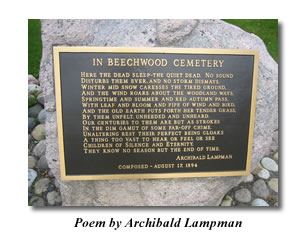 |
 |
The Confederation Poets
Archibald Lampman, Confederation Poet, lies here. He died in 1899. A large stone marks his grave.
Duncan Campbell Scott wrote about his tombstone:
"When we chose a headstone for his grave in Beechwood we brought there a boulder from the fields and had his name cut into it. There are flowers ever before it, the offerings of the summer, or the offerings of winter, sifted snow of the purest; and the union of the simple strength and beauty of natural things, the strength of the stone and the recurrent beauty of aspiring leaves and flowers and of protecting frost and snow, are typical of his work and his characters."
William Wilfred Campbell, Confederation Poet, lies here. He died in 1918. Prime Minister William Lyon Mackenzie King admired Wilfred Campbell and his writing, and after Campbell’s death started a movement to erect a memorial. A stone bench now sits beside Campbell’s grave, placed so that people can and sit and reflect on his poetry. “ flowers of dream will spring eternal” is part of the inscription on the memorial bench. A bronze plaque with a portrait of Wilfred Campbell was originally part of the bench, but has been stolen.
Duncan Campbell Scott, Confederation Poet, lies here. He died in 1947. There is an imposing monument, but no dates have been entered under his name. |
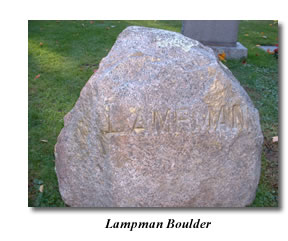 |
 |
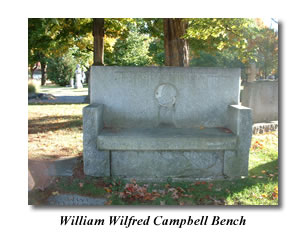 |
 |
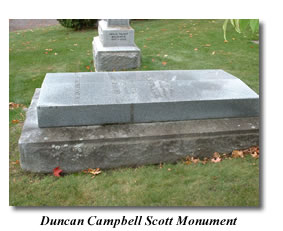 |
 |
 |
| |
IN BEECHWOOD CEMETERY
BY Archibald Lampman
Here the dead sleep--the quiet dead. No sound
Disturbs them ever, and no storm dismays.
Winter mid snow caresses the tired ground,
And the wind roars about the woodland ways.
Springtime and summer and red autumn pass,
With leaf and bloom and pipe of wind and bird,
And the old earth puts forth her tender grass,
By them unfelt, unheeded and unheard.
Our centuries to them are but as strokes
In the dim gamut of some far-off chime.
Unaltering rest their perfect being cloaks--
A thing too vast to hear or feel or see--
Children of Silence and Eternity,
|
|
 |
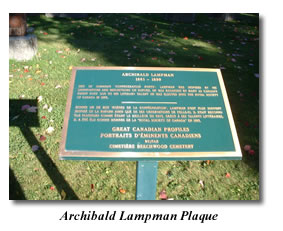 |
 |
| |
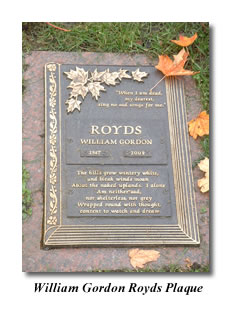 |
|
 |
Visiting The Cemetery
- The cemetery is open daily from 8 a.m. to sunset.
- The beautiful Gothic-style mausoleum is open from 8 a.m. to 5 p.m. daily.
- The reception building is open 8 a.m. to 5 p.m. Monday to Friday, 8 a.m. to noon on Saturdays, and closed on Sundays.
- The main gate to the cemetery at 280 Beechwood Ave. is several blocks west of St. Laurent Boulevard. (The street name changes from Beechwood to Hemlock after the entrance to the cemetery.
- The OC Transpo bus No. 7 stops near the entrance.
To find your way around, you can get a map of the sections from the office, or map your walk by searching the interactive maps at www.beechwoodcemetery.com. You can request a guided tour with Ian Guthrie, a member of the board, who will take groups on a 60- to 90-minute walk through Beechwood: email ian.guthrie@sympatico.ca or call 613-745-8412 |
|
 |
| |
 |
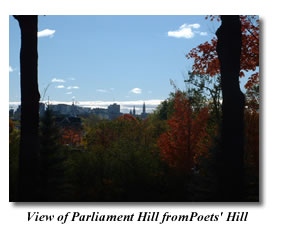 |
From BEREAVEMENT OF THE FIELDS
by William Wilfred Campbell
written on the death of his friend,
Archibald Lampman.
Soft fall the February snows, and soft
Falls on my heart the snow of wintry pain;
For never more, by wood or field or croft,
Will he we knew walk with his loved again;
No more, with eyes adream and soul aloft,
In those high moods where love and beauty reign,
Greet his familiar fields, his skies without a stain.
…
Soft fall the February snows, and hushed
Seems life's loud action, all its strife removed,
Afar, remote, where grief itself seems crushed,
And even hope and sorrow are reproved;
For he whose cheek erstwhile with hope was flushed,
And by the gentle haunts of being moved,
Hath gone the way of all he dreamed and loved.
…
Not his to wake the strident note of song,
Nor pierce the deep recesses of the heart,
Those tragic wells, remote, of might and wrong;
But rather, with those gentler souls apart,
He dreamed like his own summer days along,
Filled with the beauty born of his own heart,
Sufficient in the sweetness of his song.
…
And now, untimely cut, like some sweet flower
Plucked in the early summer of its prime,
Before it reached the fulness of its dower,
He withers in the morning of our time;
Leaving behind him, like a summer shower,
A fragrance of earth's beauty, and the chime
Of gentle and imperishable rhyme. |
|
 |
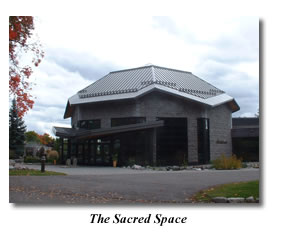 |
 |
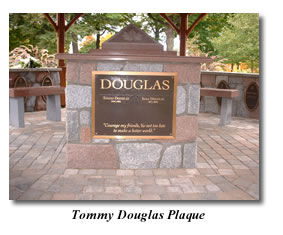 |
 |
| |
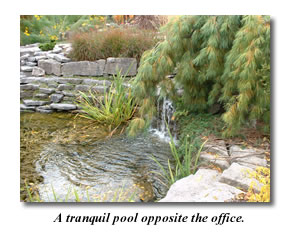 |
 |
| |
 |
| |
 |
| |
|
|
|
| |
|
| |
 |


















